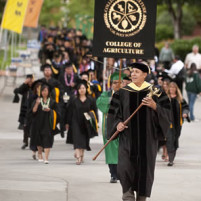Cal Poly faculty unrest leads to vote of no confidence in Ag dean
June 11, 2015
 By KAREN VELIE
By KAREN VELIE
Faculty discontent boiled over in the College of Agriculture with a majority of faculty giving Agriculture Dean Andrew Thulin a vote of no-confidence. It is the latest development in a spring of faculty and staff resentment over perceptions of unequal pay and administrative attitudes.
At issue in the College of Agriculture, are Thulin’s alleged violations of shared governance procedures, failure to involve department heads in the decision making and complaints of micro management, according to the vote of no-confidence.
The discontent with Thulin began during the search that led to his being hired.
Agriculture faculty members complained that President Jeffrey Armstrong and his administration ignored them in the selection process. Professor Wyatt Brown said that the administration is required to practice shared governance in which the faculty should have served as an advisory body during the selection process.
“There was an overwhelming sentiment against the dean,” Brown said. “I have been here for 25 years and never found this type of unrest.”
The faculty is also concerned that Thulin has elected to replace the College of Agriculture’s last remaining chair with a department head. Chairs are chosen by the faculty and department heads work at the pleasure of the dean. The change means that faculty will have little or no impact over the selection and retention of their department leadership.
Faculty and students also have voiced concerns over Cal Poly’s Master Plan. The plan, being reviewed, would possibly eliminate five fields, which includes seven acres of lemons, students use as classrooms and turn the farmland and groves into a hotels and convention center. A group of students have put up a Students for Agriculture website and are asking supporters to sign a petition opposing the move.
On the website, the students voice concerns over the loss of learn-by-doing and provide a list of which sections of Cal Poly’s 248 acres of class-one, prime farmland that the administration is considering plowing under.
“The threat and uncertainty that surrounds the loss of this land from the potential construction of  student housing, a hotel, and other projects is deeply concerning to the future of the agricultural programs at Cal Poly,” the website says. “We support the master planning team’s decision to expand Cal Poly’s campus, however, we don’t support this expansion at the expense of the agriculture program.”
student housing, a hotel, and other projects is deeply concerning to the future of the agricultural programs at Cal Poly,” the website says. “We support the master planning team’s decision to expand Cal Poly’s campus, however, we don’t support this expansion at the expense of the agriculture program.”
With the passage of the 78-21 no-confidence vote, the Agriculture faculty are seeking to compel Armstrong to take action regarding the faculty’s concerns with Thulin. The faculty has asked Armstrong to inform them of what actions he plans to take by June 15.
Neither Armstrong nor Cal Poly’s acting provost agreed to speak to CalCoastNews instead providing a press release from Matt Lazier, director of media relations.
While Lazier acknowledged that the administration had received the results of the no-confidence vote, he wrote that the College of Agriculture advisory board and the majority of department heads and chairs support Thulin. It was not immediately know how many of those department heads were Thulin appointees.
Lazier wrote that Thulin had been given the assignment of making some “difficult” changes in the college but that the changes were needed for long-term success.
“University leadership respects the voice of the faulty and firmly believes in transparency and shared governance,” Lazier wrote in an email. “It also believes in mutual respect and an understanding that there will not be agreement on all issues.”
A number of Cal Poly faculty and staff have complained about a lack of transparency in decision making by Armstrong’s administration. Cal Poly also has experienced vocal disagreement from faculty and staff over its salary policies with complaints about what faculty see as favoritism in granting large raises to administrators, an increase in the number of administrators while faculty numbers remain small, continued requirements for faculty members to increase their workload and no raises for faculty or staff for a number of years.
This year, faculty and staff received raises under contract negotiated by faculty and staff unions.






The comments below represent the opinion of the writer and do not represent the views or policies of CalCoastNews.com. Please address the Policies, events and arguments, not the person. Constructive debate is good; mockery, taunting, and name calling is not. Comment Guidelines